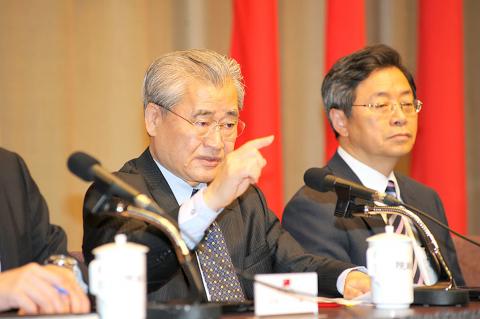Taiwan’s working-age population is expected to decline by 180,000 next year, Premier Mao Chi-kuo (毛治國) said yesterday, underscoring the need for a policy overhaul to meet new challenges.
“The seriousness of the demographic shrinking deserves serious attention,” Mao told a press conference after the weekly Cabinet meeting.
Citing research by the National Development Council, Mao said the nation’s working-age population — people aged 15 to 65 — is expected to reach its peak this year at 17 million.

Photo: CNA
Taiwan had a total population of 23.4 million as of last month.
“The council estimated that the working population would decrease at a rate of 180,000 per year starting next year, which would add up to 1.8 million people in 10 years,” Mao said, describing the pace of the decline as a “steep, parabolic” curve.
An aging society and a falling birthrate require new thinking in formulating policies, ranging from economic development to industrial structure, education, social welfare and childcare, Mao said.
In addition to a series of measures in place to construct a healthy environment to encourage more people to have children, the government needs to create a decent work environment and conditions to increase labor participation, as well as refine its immigration policy to increase the workforce, the premier said.
The council estimated that Taiwan’s population would peak at about 23.5 million or 23.6 million between 2019 and 2026.
The council said that Taiwan would become an aged society, in which people aged 65 or older account for at least 14 percent of the population, in 2018, and enter a super-aged society in 2025 when more than 20 percent of the population is composed of people aged 65 or above.
Taiwan became an aging society in 1993, when the demographic accounted for 7 percent of the population.

AIR SUPPORT: The Ministry of National Defense thanked the US for the delivery, adding that it was an indicator of the White House’s commitment to the Taiwan Relations Act Deputy Minister of National Defense Po Horng-huei (柏鴻輝) and Representative to the US Alexander Yui on Friday attended a delivery ceremony for the first of Taiwan’s long-awaited 66 F-16C/D Block 70 jets at a Lockheed Martin Corp factory in Greenville, South Carolina. “We are so proud to be the global home of the F-16 and to support Taiwan’s air defense capabilities,” US Representative William Timmons wrote on X, alongside a photograph of Taiwanese and US officials at the event. The F-16C/D Block 70 jets Taiwan ordered have the same capabilities as aircraft that had been upgraded to F-16Vs. The batch of Lockheed Martin

GRIDLOCK: The National Fire Agency’s Special Search and Rescue team is on standby to travel to the countries to help out with the rescue effort A powerful earthquake rocked Myanmar and neighboring Thailand yesterday, killing at least three people in Bangkok and burying dozens when a high-rise building under construction collapsed. Footage shared on social media from Myanmar’s second-largest city showed widespread destruction, raising fears that many were trapped under the rubble or killed. The magnitude 7.7 earthquake, with an epicenter near Mandalay in Myanmar, struck at midday and was followed by a strong magnitude 6.4 aftershock. The extent of death, injury and destruction — especially in Myanmar, which is embroiled in a civil war and where information is tightly controlled at the best of times —

Taiwan was ranked the fourth-safest country in the world with a score of 82.9, trailing only Andorra, the United Arab Emirates and Qatar in Numbeo’s Safety Index by Country report. Taiwan’s score improved by 0.1 points compared with last year’s mid-year report, which had Taiwan fourth with a score of 82.8. However, both scores were lower than in last year’s first review, when Taiwan scored 83.3, and are a long way from when Taiwan was named the second-safest country in the world in 2021, scoring 84.8. Taiwan ranked higher than Singapore in ninth with a score of 77.4 and Japan in 10th with

SECURITY RISK: If there is a conflict between China and Taiwan, ‘there would likely be significant consequences to global economic and security interests,’ it said China remains the top military and cyber threat to the US and continues to make progress on capabilities to seize Taiwan, a report by US intelligence agencies said on Tuesday. The report provides an overview of the “collective insights” of top US intelligence agencies about the security threats to the US posed by foreign nations and criminal organizations. In its Annual Threat Assessment, the agencies divided threats facing the US into two broad categories, “nonstate transnational criminals and terrorists” and “major state actors,” with China, Russia, Iran and North Korea named. Of those countries, “China presents the most comprehensive and robust military threat